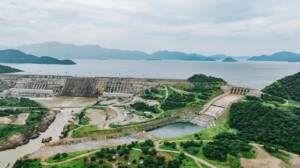Rising Blue Nile: Sudan calls on residents to take safety precautions
The General Directorate of Dams at Sudan’s Ministry of Irrigation and Water Resources has called on the public living on both banks of the Blue Nile to take safety precautions, as it expects an increase in the water flow of the Blue Nile following heavy rainfall on the Ethiopian plateau.
 Previous floods in Blue Nile State (File photo: HAC)
Previous floods in Blue Nile State (File photo: HAC)
The General Directorate of Dams at Sudan’s Ministry of Irrigation and Water Resources has called on the public living on both banks of the Blue Nile to take safety precautions, as it expects an increase in the water flow of the Blue Nile following heavy rainfall on the Ethiopian plateau.
In a press statement on Sunday via the official Sudan News Agency (SUNA), Engineer Mutasim El Awad, head of the General Directorate of Dams, pointed out that there will be a gradual increase in the water levels of the Blue Nile, south of the Roseires Dam and north of it to Khartoum.
Notwithstanding the added factor of the recent heavy rains, as previously reported by Radio Dabanga, the Ministry of Irrigation in Sudan says that engineers are working to anticipate all possible scenarios resulting from the controversial filling of the Grand Ethiopian Renaissance Dam (GERD), to mitigate the expected negative effects when the dam begins to fill in June. Work is being done specially to improve the systems of emptying and filling of the reservoirs of El Roseires in Blue Nile state and Jebel Aulia in southern Khartoum.
In June, Engineer Dabet Abdelrahman predicted that the volume of water from the Blue Nile (which flows from the Ethiopian highlands to its confluence with the White Nile at Khartoum) is likely to decrease from April to the end of September, so that water levels in this sector will be reduced in general.
The engineer added that the White Nile sector will also be affected by the filling of the Renaissance Dam in relation to the modification of the operating systems of the Jebel Alya reservoir. The main Nile stream of Khartoum will be exposed to the same effects, the volume of water will be reduced, the levels will decrease, and the area of cultivated pastures will be reduced.











 and then
and then